WYKEHAM HENRY KOBA FREAME, DCM
an ANZAC in the family
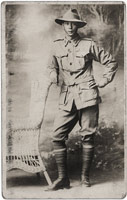
(thumbnails are links to larger files)
Page 5 |
|
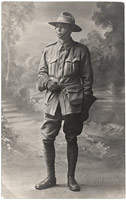
Henry Freame, DCM
|
How long Henry actually spent in hospital I've not yet discovered, but on 6th December 1915 he was placed on the Supernumerary List, (no longer fulfilling his function in the army but not discharged). Reading between the lines it appears that Henry's right elbow was shattered and although his wound healed his arm remained disabled and he was no longer able to hold and fire a rifle.
For a man who seemed to thrive on action and being at the centre of any action this must have been a terrible blow and he fought against this decision., |
According to Brian Tate, in his book, 'The Gallipol Samurai' [10 pps.93-100 ] Henry was intent on gaining a commission in the army. We can read that Henry was well thought of by highly placed officers in the military and that his name came up and was discussed favourably but with the proviso that he could only be considered if he was on active service. It was suggested that Henry needed to rejoin his battalion before he could be considered for a commission. Tate cites an undated letter, written by Henry to May, in which he copies out General Walker's encouraging letter and goes on to add that he will try everything to ensure he is passed for active service and then go on to apply for a commission.
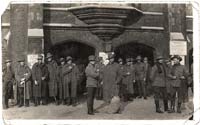
London, January 1916
|
In the meantime he had received more letters of support and commendation from ranking offices, regarding his wish to seek a commission and Henry was finally passed as fit for service by the medical board in England in Jan/Feb of 1916. However, one important consideration was that he wasn't able to carry a rifle.
Interestingly, Tate introduces the issue of race into the equation [p.95] when he quotes from a short memo, accompanying a letter, from General Walker to Colonel White ... "my dear White, the bearer of this is Segt. Freame whom you know as well as I do ... He's too valuable a man to lose however. He wants a Commission - personally I think he's earned one but Gen Godley may not like to give one to a Mexican - still you wll be short of officers and the 1st Battn thought no end of him ... " |
On 25th March, 1916, Henry's service record shows him embarking at Weymouth, with the 26th Draft, to rejoin the M.E.F.
He disembarked at Alexandria on 6th April, 1916 but only 4 days later he was admitted onto a hospital train at Tel el Kebir, on the 10th. When he reached Helipolis he was admitted to the No. 3 Aux. Hospital on the 16th April. About 4 weeks later, in mid May, he was transferred to the 1st Aux. Hospital, still in Heliopolis. The reason again being recorded as the gunshot wound to his arm.
On the 24th June he was recorded as being invalided from the Port of Suez to Port Sydney, Australia. As a result of his wound he was recommended for discharge from the army.
His formal discharge was dated 20th November, 1916. How devastating was this, for him? He had embraced Australia as his home and the country to which he wanted to belong; and for which to fight. What would he do now?
There is an official stamp on his service records, stating, 'Copy made for War Pensions' so, presumably, he had some small source of income. Did he have any plans in mind when he landed back in his adopted country? What we do know is that earlier in 1916 there had been governmental discussions between the various states concerning the return of soldiers after discharge through disablility or the end of the war. It focused on selling or leasing land to the soldiers and creating settlements that would both help the returning servicemen to return to civilian life and also open up new areas for cultivation. When Henry returned to Australia in late 1916, the fledgling scheme was already in operation in NSW and Henry put in his application for a holding.
The NSW State Records reveal that Wykeham Henry Freame, living at 2, Bondi Rd., Bondi, had been granted a holding of orchard land on the 20th November 1916. On paper and in theory, this scheme seems wonderful but, like most seemingly wonderful ideas, there can be diguised agendas and hidden snags and this enterprise was certainly no different.
To find out more about the Soldier Settlement Scheme and the ideas that drove it; its limited successes and inherent problems, visit the links at the bottom of this page HERE.
Trying to learn as much about Henry and his life as possible, I'm beginning to realise that he never appeared to do things by 'half measures'. He would bring his best efforts to whatever he attempted. He would have been one of the earliest applicants for the scheme but although he was accepted in November 1916 there's no indication of when he entered into his new job on the land. We do know, from one of May's surviving letters, that sometime before1920 Henry was also employed as the Storekeeper and Post Master on the Kentucky Settlement.
It was probably soon after the end of the war, in early 1919, that Henry's wife, May went out to join him in Australia. In a letter written in April 1921 she mentions having been in Australia for two years. It's a long, newsy letter, to her brother and sister-in-law in Failsworth.
... We are having several little changes here in Kentucky lately. The young fellow who took over the Store & Post Office from Henry, has given it up to open a Store here on his own. He naturally desired to take the Post Office with him, but the Department were up against him for that, & they have taken further steps, and retained it at the Government Store. He was evicted from his position as Postmaster at a minutes notice last Friday night at 12pm, by an official from Sydney with no reason at all. On the Sat. morning all the settlers protested against this action & passed a motion to that effect sending it down to Sydney for further actions to be taken. I don't know whether it will do any good or not. The Settlement Manager received a very quick notice of transfer to another settlement further north. The new manager is here, but so far I have not met him, but suppose he will be giving us a call before long. I hope he will be alright for the Settlers. We had a farewell Social in the Hall last week and had a most enjoyable time. There was a record meeting of 160 people which proved the Hall much too small. Mr. Thomas was presented with a handsome travelling bag. He left for his new place yesterday...
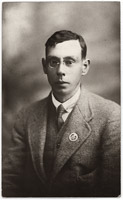 |
We were pleased to receive your letter dated 30-1-21 saying you had got the photos alright, yes, Henry does look slightly different with glasses on but I rather like them ... |
... we both often have a little chat over old times we have spent at Failsworth & it is good to remember them. Tell Priscilla we were talking of the time we all had at Belle Vue & the photos she thought she had taken ah; ah; We hope Priscilla too is much improved in health with the fine weather you should be having now, & convey our love & best wishes to her, Mr. C & Asa. I suppose we shall be hearing of Asa doing the deed one of these days & joining the "married ranks"...
To tell you the truth Lizzie, that is one of the things I miss most out here ... we only have service once a month & that is held in the little Iron Hall, which is scorching hot in summer & stone cold in winter. Since Mr. Comie has left we have not had even those regular, but there is another minister who has been given the Call & who we have heard & we hope he may accept & then perhaps we may be able to get into a regular way again. They will be a long time before they get another minister who will deliver sermons like Mr. Comie...
It being Easter week, last Monday Henry & I drove into Uralla to the Sports there. They consisted of 75 & 100 yds foot Races, Pony [?] High Jumping, Musical Chairs with horses, & Bending[?] Races etc. It was a fairly bright day, and there was quite a good crowd of people. There had been a special train down from Armidale bringing 700 people. We had tea in town & finished up with the Pictures at night, & arrived home at 12-30 am after a happy time. We have got the Diggers here harvesting our Potato crop, but sorry to say so far we have not benefited any by the marketing of them. Henry got the returns from a ton sold, yesterday, & he benfits to the amount of 4/- so you see farming is like everything else it varies. Last year was a good year, & of course we were able to buy lots of things that were required and pay the Dept their dues, after which we were able to keep ourselves from the last of the crop until now, without drawing any further sustenance (which makes all the less for us to have to pay back to the Dept.) Of course we hope prices & sales may improve as time goes on, & then we have the turnips nearly ready for harvesting, & hope we may do well with those. I am pleased we are not like a lot of the Settlers in so much debt, as we have paid for all things as we got them, & Henry has more implements etc than anyone else. So you see if we are losing a bit, we have got value in another way. We are not in anyway downhearted, only Henry is worrying in case he may not be able to keep his promise to mother in regard to my paying a visit home soon. I tell him not to worry, we cannot order things just as we would like. If I cannot get home, mother is big-hearted enough to know it is no fault of one's, but I consider there is still hope & will not worry about it. I have only been here two years & the promise was in five years.
We have two boys camping here, they have only been out since last Sept. They came to another brother who has a Block here, after being here a little while they began to find they were not wanted by their sister-in-law. They were doing odd work for Henry & rather than see them take to tramping the country Rabbit Trapping etc, Henry offered they should camp here & dig his Potatoes etc. They did so & have been here since Jan. & are as happy as bees. They are intending joining another brother who is going in for Dairy Farming on the North Coast. He is up there looking at some farms now, so if all goes well I suppose we shall not have them here long. One of them was farming round Penkridge[?] for nine years & is an all round man. They are nice boys & we shall miss them when they go. Well Lizzie, I think I have exhausted my little budget this time & no doubt you will think it a patchy letter but what can a lady do when they live in the country? Oh we had a pleasant surprise this morning, when I went out on the back verandah I heard a brass band playing beautifully & the music came floating through the trees. I almost imagined I was at Redcar or in the Mi'bro' Park. It did sound good. it was a band come up from Watcha Rd (20 miles) to play a few selections. It is the first time & I hope it won't be the last....
From Your Loving
Brother & Sister,
Henry & May
Heaps of love & kisses for all."
Her letter is upbeat and positive, with no sign of the despair that would overtake her within 12 months.
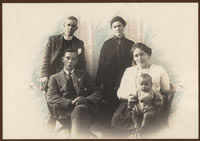
May 1922 |
In December 1921 May gave birth to their son, to be named Henry Wykeham ... always to be known as 'Harry' in family circles. We don't have any letters, from either May or Henry, survivng from this time but, from a later letter of Henry's, we know that they had to employ live-in help for May and the baby ... and the crop yield had not been good.
With hindsight I believe that we can assume that May was suffering from severe post natal depression and, for her, it became an imperative to return to England and her mother, at all costs. Despite Henry's pleas that she wait until the following year when, hopefully, he might be able to go with her, May, along with her mother's-help Josephine Clarke, and the 7 month old baby Harry, sailed from Sydney, for England, on the 2nd July 1922 on board the 'Benalla' |
From one of Henry's own letters to Frank & Lizzie we know that Henry spent the following 14 months alone, working all the hours possible to make a success of his farm, concerned about finances and worrying that he was receiving very little news of his wife and son thousands of miles away in Middlesborough with her mother. From this letter we know that he was lonely and he writes, "... I haven't had pleasure of watching my little man growing from or to say changing out of babyhood to a little boyhood ..."[sic]
May eventually returned to Australia over a year after she had left, sailing from London on the 28th August, 1923. With her was her son Harry, now a toddler, and Josephine Clarke. May returned towards the end of an Australian winter which was recorded as being the worst for many years forcing many of the soldier-settlers to give up and walk away. Ten days after May's departure, her mother wrote to Frank, in Failsworth, saying how worried she had been about May's state of mind whilst she had been staying with them, "... she would sit day in and day out, night after night and have no conversation and I was always with her ..." Emily goes on to write that she thought May "... much better when she went away ... " Sadly it appears that this improvement would only be shortlived as, in February 1924 her mother, Emily, died ... was news of this the final straw for May's already fragile mental health?
Reading 'The Gallipoli Samurai' we realise that Josephine Clarke & Mrs. Josephine Collins (Henry's housekeeper after May's return and the mother of his daughter, Grace, in 1927) are actually one and the same person. In the book Josephine Collins is referred to as, Josephine Clarke, born to Elizabeth and Thomas Clarke, in Tenterfield, NSW, in 1886. She had been married to a Brisbane surveyor, named Walter Warner Collins and they had a son, born in 1914, named John ('Chappie' as he was more commonly known). The marriage had, apparently broken down at some date. Was this why she was using her maiden name when she accompanied May to England for over 14 months? And where was her 8 year old son? Josephine returned to Australia with May in 1923 but did she also return to Kentucky with May at the same time? The narrative in the book makes no mention of the trip to England or of Josephine's employment, as Josephine Clarke, by Henry in 1922. It does, however, add the information that John ('Chappie') was living in the Freame household in the years after 1923.
''Soldier Settlement'... general links for information:
NSW State Records home page
Returned Soldiers Settlement Records at NSW State Records
About soldier settlements HERE
Doctor of Philosophy (PhD) Thesis : 'Soldier Settlement After WW1 in South Western Victoria' by Ken Frost 2002 HERE
|
|




